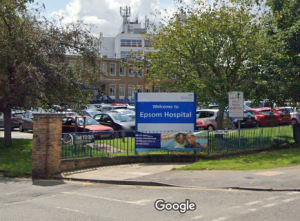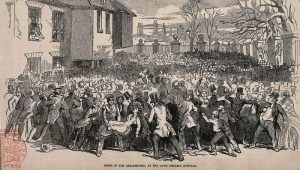Epsom and St Helier Hospital NHS Trust claims it has a ‘strong’ maternity service despite failings in a recent CQC report. Safety in the maternity service was rated ‘inadequate’ in a report published by the Care Quality Commission (CQC) in February. The service overall was downgraded from ‘good’ to ‘requires improvement’.
Managing Director of the Trust James Blythe said, at an Epsom and Ewell Health Liaison Panel on March 3, he was “disappointed” with the CQC report. He added: “The hospital has a really strong service and what the CQC identified are processes we need to get stronger at.”
However, the CQC’s report highlights practical issues including qualifications and competence of staff, and an environment ‘not fit for purpose’.
An update report by the Trust given to the Epsom and Ewell Health Liaison Panel said: “All of our maternity services meet 10 out of the 10 safety actions required nationally.” The 10 safety actions are specific to maternity services and range from submitting maternity data, workforce planning, training and action plans, to delivering best practice.
However, the CQC report found the leadership team ‘did not take timely action’ to make change where non-compliance with four safety actions was identified in the 2022/23 inspection.
A report in July 2022 identified a shortfall of midwives, yet this had still not been addressed in January 2023. The service was therefore unable to declare compliance with safety action 5 on midwifery workforce planning.
The CQC report said: “On inspection, there was a lack of clarity from managers and leaders about whether the service was on track to make improvements and declare compliance for 2023/24.”
Epsom and St Helier hospital Trust were asked about the discrepancy between the agenda stating they met all 10 safety actions and the CQC inspection report outlying non-compliance of safety actions. The Trust did not comment on the difference.
The Trust is planning to invest more than £2m over two years to increase midwifery staffing in the unit by 8% so the Trust can declare full compliance with safety action 5.
Visiting the hospital in August 2023, the CQC found the service “did not have enough midwifery and nursing staff in the right areas with the right qualifications, skills and training to care for women, birthing [partners] and babies”.
Staff working in transitional care for babies who require extra support “did not have the qualifications and competence for the role they were undertaking.”
A spokesperson from Epsom and St Helier said: “Our priority is to ensure women and birthing people receive the best possible care, and we have already taken steps to improve and strengthen our maternity services – rated by mums in the CQC’s own survey as the best in London.”
Days before the inspection report was published, the Trust secured a strong result in a CQC patient experience survey of women and birthing partner’s experiences of maternity care in England.
Maternity services at Epsom and St Helier received the best scores in London, with maternity care at St George’s joint second place.
The environment in some areas was ‘not fit for purpose’, and on the maternity ward this posed an ‘infection prevention and control risk’. Bereavement and recovery facilities did not meet national standards for privacy.
The Trust is said it is ‘fast-tracking’ estates work with new doors and blinds fitted to improve privacy and dignity.
The hospital’s environment was “not fit for purpose in all areas” and the facilities and equipment were found to “not always keep people safe”.
An Epsom and St Helier spokesperson implied that patients deserve better than the current crumbling estate – but the hospital can still deliver and receive safe care.
Founded in 1938, approximately 90% of St Helier Hospital pre-dates the NHS itself. A further 98% of the St Helier estate is said to be either in very poor or bad condition and requires capital investment or replacement.
Millions are said to be invested every year to address the most urgent estate challenges, while also improving the buildings, facilities, equipment and environment for patients and staff.
A spokesperson for Epsom and St Helier University Hospitals NHS Trust said: “This new rating is partly a reflection of our ageing estate, and – while the care they receive is safe – mums, babies and other patients deserve better, which is why we’re pleased the Government has promised us a new hospital and upgrades to our existing facilities by 2030.”











